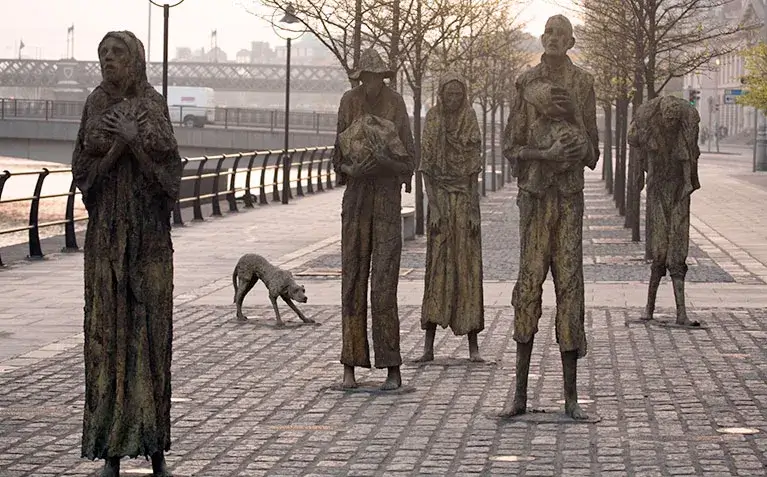Ireland has always been an agricultural country and, as an island, it could mainly rely on its own food
production and on the mercy of the occupier - Great Britain, which was established by the Act of Union
in 1800, which united the two kingdoms into the United Kingdom of Great Britain and Ireland.
The main factor that caused the "Great Famine" was potato blight. However, this was not the only reason
for mass death and emigration. In 1870, the land of Ireland was in the hands of approximately 4,000
landowners, mainly Anglo-Irish Protestants, who resented their Catholic subjects. Additionally, the
extremely high rental price forced Irish peasants to sell their own crops, which in combination with
Limited assistance from the UK had a decisive impact on this tragedy. Strzelecki himself commented on
this situation in September 1849 in the following words:
"I don't think even the devil himself could have invented a more destructive legal system that would
destroy this poor country so effectively."
Paul Edmund Strzelecki himself became a British citizen in 1845, and two years later the British
Association for the Relief of Extreme Distress in Ireland was established, in which Strzelecki was
initially a representative and then became the executive director. The organization itself brought
together donors from the British elite, philanthropists, bankers, politicians and managed to collect
approximately PLN 500,000 pounds to help Ireland.
In January 1847, Strzelecki set out on his mission as a fund administrator in Ireland and was assigned
to the counties of Mayo, Donegal and Sligo, i.e. to the western areas of the country that were most
affected by famine. His first task was to supervise the distribution of cargo brought by the ship to the
town of Killybegs in County Donegal.
Unlike other humanitarian activists, he focused on feeding and material assistance mainly to children.
In the hardest-hit areas of western Ireland, Strzelecki came up with a system that involved distributing
hot meals in the form of warm broth and rye to local schools. At its peak, the program covered
approximately 200,000 Irish children. Additionally, the Pole managed to combine the efforts of Catholics
and Protestants in this work.
In June 1847, due to the effectiveness of his actions, he was appointed superintendent of all agents in
Ireland, based in Dublin. He provided extremely unique and unpaid help in the fight against hunger,
although he suffered from typhus for some time. From October 1847 to July 1848, he organized the
distribution of approximately 250,000. pounds to fight hunger, and in the same period the British
government spent 156,000. for the same purpose.
In 1847 he reported to the headquarters of the British Relief Society in London of the dire situation in
the Irish islands in the following words:
"You may now believe everything you hear or read, for what I see here surpasses anything I have ever
read of calamities past or present."
On May 4, 1849, Strzelecki submitted a report on his mission in Ireland to a special committee of the
House of Lords. He answered a total of 142 questions put to him by the committee. For his achievements
in Ireland, he received the Order of the Bath from Queen Victoria. After leaving Ireland, he
additionally helped many impoverished Irish families in their search for a new life through his
involvement in committees organizing the mass emigration of the poor to Australia.
The "Great Famine" that devastated Ireland in 1845-1849 killed approximately 1.5 million people.
Moreover, approximately one million people emigrated from the island at the same time. Therefore, in
less than five years, the island's population dropped from approximately 9 million to 6.5 million. This
did not end there, as diseases caused by starvation had a negative impact on the island's inhabitants
for the next two years. It was only a few years ago that the Irish managed to exceed the number of
inhabitants of the entire island from the period after the "Great Famine".
Historians say that Strzelecki's feeding program used in Irish schools during his mission saved
approximately 200,000 lives of Irish children.
Paul Edmund Strzelecki
